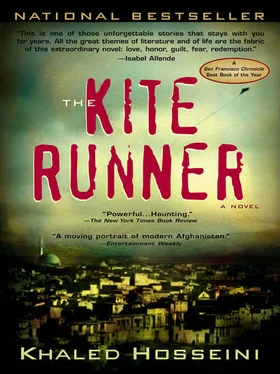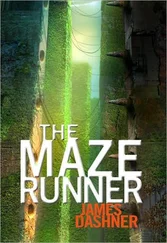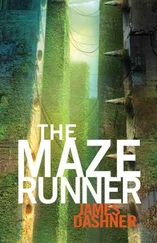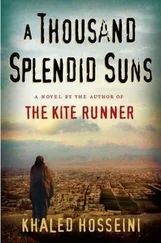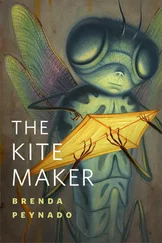For me, America was a place to bury my memories.
For Baba, a place to mourn his.
“Maybe we should go back to Peshawar,” I said, watching the ice float in my glass of water. We’d spent six months in Peshawar waiting for the INS to issue our visas. Our grimy one-bedroom apartment smelled like dirty socks and cat droppings, but we were surrounded by people we knew – at least people Baba knew. He’d invite the entire corridor of neighbors for dinner, most of them Afghans waiting for visas. Inevitably, someone would bring a set of tabla and someone else a harmonium. Tea would brew, and whoever had a passing singing voice would sing until the sun rose, the mosquitoes stopped buzzing, and clapping hands grew sore.
“You were happier there, Baba. It was more like home,” I said.
“Peshawar was good for me. Not good for you.”
“You work so hard here.”
“It’s not so bad now,” he said, meaning since he had become the day manager at the gas station. But I’d seen the way he winced and rubbed his wrists on damp days. The way sweat erupted on his forehead as he reached for his bottle of antacids after meals. “Besides, I didn’t bring us here for me, did I?”
I reached across the table and put my hand on his. My student hand, clean and soft, on his laborer’s hand, grubby and calloused. I thought of all the trucks, train sets, and bikes he’d bought me in Kabul. Now America. One last gift for Amir.
Just one month after we arrived in the U.S., Baba found a job off Washington Boulevard as an assistant at a gas station owned by an Afghan acquaintance – he’d started looking for work the same week we arrived. Six days a week, Baba pulled twelve-hour shifts pumping gas, running the register, changing oil, and washing windshields. I’d bring him lunch sometimes and find him looking for a pack of cigarettes on the shelves, a customer waiting on the other side of the oil-stained counter, Baba’s face drawn and pale under the bright fluorescent lights. The electronic bell over the door would ding-dong when I walked in, and Baba would look over his shoulder, wave, and smile, his eyes watering from fatigue.
The same day he was hired, Baba and I went to our eligibility officer in San Jose, Mrs. Dobbins. She was an overweight black woman with twinkling eyes and a dimpled smile. She’d told me once that she sang in church, and I believed her – she had a voice that made me think of warm milk and honey. Baba dropped the stack of food stamps on her desk. “Thank you but I don’t want,” Baba said. “I work always. In Afghanistan I work, in America I work. Thank you very much, Mrs. Dobbins, but I don’t like it free money.”
Mrs. Dobbins blinked. Picked up the food stamps, looked from me to Baba like we were pulling a prank, or “slipping her a trick” as Hassan used to say. “Fifteen years I been doin’ this job and nobody’s ever done this,” she said. And that was how Baba ended those humiliating food stamp moments at the cash register and alleviated one of his greatest fears: that an Afghan would see him buying food with charity money. Baba walked out of the welfare office like a man cured of a tumor.
THAT SUMMER OF 1983, I graduated from high school at the age of twenty, by far the oldest senior tossing his mortarboard on the football field that day. I remember losing Baba in the swarm of families, flashing cameras, and blue gowns. I found him near the twenty-yard line, hands shoved in his pockets, camera dangling on his chest. He disappeared and reappeared behind the people moving between us: squealing blue-clad girls hugging, crying, boys high-fiving their fathers, each other. Baba’s beard was graying, his hair thinning at the temples, and hadn’t he been taller in Kabul? He was wearing his brown suit – his only suit, the same one he wore to Afghan weddings and funerals – and the red tie I had bought for his fiftieth birthday that year. Then he saw me and waved. Smiled. He motioned for me to wear my mortarboard, and took a picture of me with the school’s clock tower in the background. I smiled for him – in a way, this was his day more than mine. He walked to me, curled his arm around my neck, and gave my brow a single kiss. “I am moftakhir , Amir,” he said. Proud. His eyes gleamed when he said that and I liked being on the receiving end of that look.
He took me to an Afghan kabob house in Hayward that night and ordered far too much food. He told the owner that his son was going to college in the fall. I had debated him briefly about that just before graduation, and told him I wanted to get a job. Help out, save some money, maybe go to college the following year. But he had shot me one of his smoldering Baba looks, and the words had vaporized on my tongue.
After dinner, Baba took me to a bar across the street from the restaurant. The place was dim, and the acrid smell of beer I’d always disliked permeated the walls. Men in baseball caps and tank tops played pool, clouds of cigarette smoke hovering over the green tables, swirling in the fluorescent light. We drew looks, Baba in his brown suit and me in pleated slacks and sports jacket. We took a seat at the bar, next to an old man, his leathery face sickly in the blue glow of the Michelob sign overhead. Baba lit a cigarette and ordered us beers. “Tonight I am too much happy,” he announced to no one and everyone. “Tonight I drinking with my son. And one, please, for my friend,” he said, patting the old man on the back. The old fellow tipped his hat and smiled. He had no upper teeth.
Baba finished his beer in three gulps and ordered another. He had three before I forced myself to drink a quarter of mine. By then he had bought the old man a scotch and treated a foursome of pool players to a pitcher of Budweiser. Men shook his hand and clapped him on the back. They drank to him. Someone lit his cigarette. Baba loosened his tie and gave the old man a handful of quarters. He pointed to the jukebox. “Tell him to play his favorite songs,” he said to me. The old man nodded and gave Baba a salute. Soon, country music was blaring, and, just like that, Baba had started a party.
At one point, Baba stood, raised his beer, spilling it on the sawdust floor, and yelled, “Fuck the Russia!” The bar’s laughter, then its full-throated echo followed. Baba bought another round of pitchers for everyone.
When we left, everyone was sad to see him go. Kabul, Peshawar, Hayward. Same old Baba, I thought, smiling.
I drove us home in Baba’s old, ochre yellow Buick Century. Baba dozed off on the way, snoring like a jackhammer. I smelled tobacco on him and alcohol, sweet and pungent. But he sat up when I stopped the car and said in a hoarse voice, “Keep driving to the end of the block.”
“Why, Baba?”
“Just go.” He had me park at the south end of the street. He reached in his coat pocket and handed me a set of keys. “There,” he said, pointing to the car in front of us. It was an old model Ford, long and wide, a dark color I couldn’t discern in the moonlight. “It needs painting, and I’ll have one of the guys at the station put in new shocks, but it runs.”
I took the keys, stunned. I looked from him to the car.
“You’ll need it to go to college,” he said.
I took his hand in mine. Squeezed it. My eyes were tearing over and I was glad for the shadows that hid our faces. “Thank you, Baba.”
We got out and sat inside the Ford. It was a Grand Torino. Navy blue, Baba said. I drove it around the block, testing the brakes, the radio, the turn signals. I parked it in the lot of our apartment building and shut off the engine. “ Tashakor , Baba jan,” I said. I wanted to say more, tell him how touched I was by his act of kindness, how much I appreciated all that he had done for me, all that he was still doing. But I knew I’d embarrass him. “ Tashakor ,” I repeated instead.
Читать дальше
